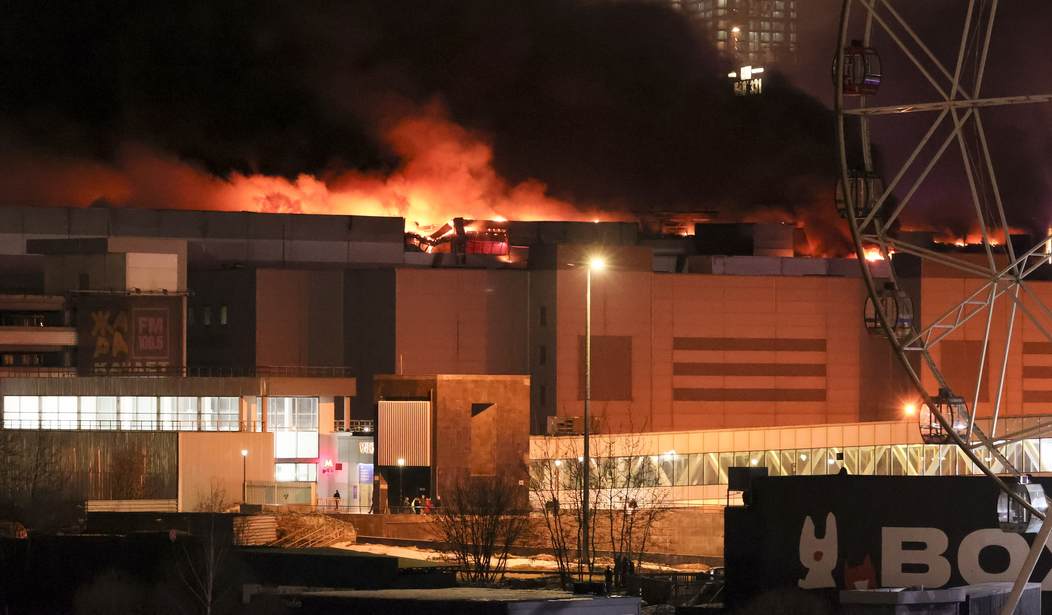Russian President Vladimir Putin was warned of a terrorist attack in the days before the slaughter by ISIS-K terrorists at a Moscow theater.
U.S. intelligence had been tracking a cell of ISIS-K terrorists since November, according to sources in the intelligence community, and knew that the terrorists were planning an attack in Moscow. On March 8, the U.S. embassy in Moscow issued a warning of an "imminent threat" and told Americans to avoid venues with large crowds, like concert halls.
ISIS-K is the Afghanistan offshoot of the Islamic State terrorist organization. The Russian Security Service, FSB, says they foiled an ISIS-K plot last week to shoot up a Moscow synagogue. The New York Times quotes intelligence sources who believe the attack on the theater and the warning of an "imminent attack" were connected.
As recently as last Tuesday, Putin dismissed the warnings of an attack from the U.S., calling it an attempt "to intimidate and destabilize our society."
NSC spokesperson Adrienne Watson said in a statement that “the US government had information about a planned terrorist attack in Moscow.”
“The US government also shared this information with Russian authorities in accordance with its longstanding ‘duty to warn’ policy,” she added.
The FSB says they've detained four suspects in the attack and are holding at least 11 others who may be connected to ISIS-K. The four suspects are all from the ex-Soviet republic of Tajikistan, which borders Afghanistan.
The attack has killed at least 143 and wounded another 150.
Putin is already trying to blame Ukraine for the attack. Ukraine's foreign ministry issued a statement denying any role in the attack.
"We categorically reject accusations of Ukraine's alleged involvement in the shooting at the Crocus concert hall in Krasnogorsk near Moscow," the ministry said.
Some in the intelligence community reject the idea that Putin carried out a "false flag" operation. “The US Embassy warning in early March indicates we had intelligence on some sort of planning,” said Thad Troy, a former Central Intelligence Agency Russia specialist. “I doubt it’s a false-flag. Putin is secure and doesn’t need to do that.”
Some analysts see Putin blaming Ukraine in order to justify imposing full conscription and bringing Russia to a total war footing. That would be inviting dissent and the last thing Putin needs is a Russia any more divided than it already is.
But Putin could still use the attack to his political advantage.
“The obvious route for the Kremlin to spin this is that it’s something to do with the war in Ukraine,” said Charles Lichfield, deputy director of the Atlantic Council’s GeoEconomics Center in Washington. “The immediate response could be more drone attacks and ballistic attacks, but they already increased before the terrorist attacks.”
Indeed, the recent massive attack on Ukraine's energy grid, including the crucial Dnieper hydroelectric dam, shows that Putin doesn't need an excuse to escalate Russia's attacks.
Friday’s bloody assault was a throwback to an earlier period of Putin’s quarter-century rule, when suicide bombings, most blamed on Islamists from within Russia or its neighbors, killed scores of people. It shattered the illusion of security in Moscow that Putin has sought to cultivate in the more than two years since he invaded Ukraine.
Islamist groups have targeted Russia in the past citing what they call anti-Muslim policies by the Kremlin. The seizure of a school in Beslan in the south of the country led to more than 330 fatalities, many of them children, in 2004. In 2010, twin suicide attacks in Moscow subway stations killed at least 40, while a suicide bombing killed 16, including the attacker, in the St. Petersburg subway in 2017.
Why Russia? ISIS-K sees Putin as Islam's biggest enemy and this foray outside of Afghanistan does not bode well for the Russian people.
"ISIS-K has been fixated on Russia for the past two years, frequently criticizing Putin in its propaganda," said Colin Clarke, with the Soufan Center, an independent foreign policy research center. ISIS-K has joined with other Central Asian Islamist groups giving the terrorists a safe haven and base in Russia to carry out more attacks.
This is only the beginning.










Join the conversation as a VIP Member